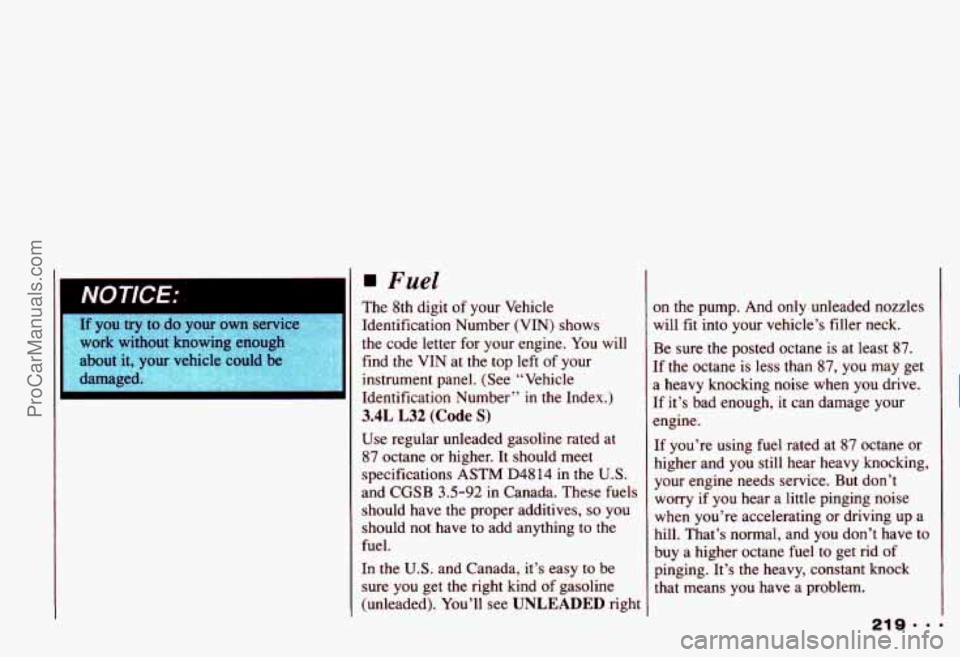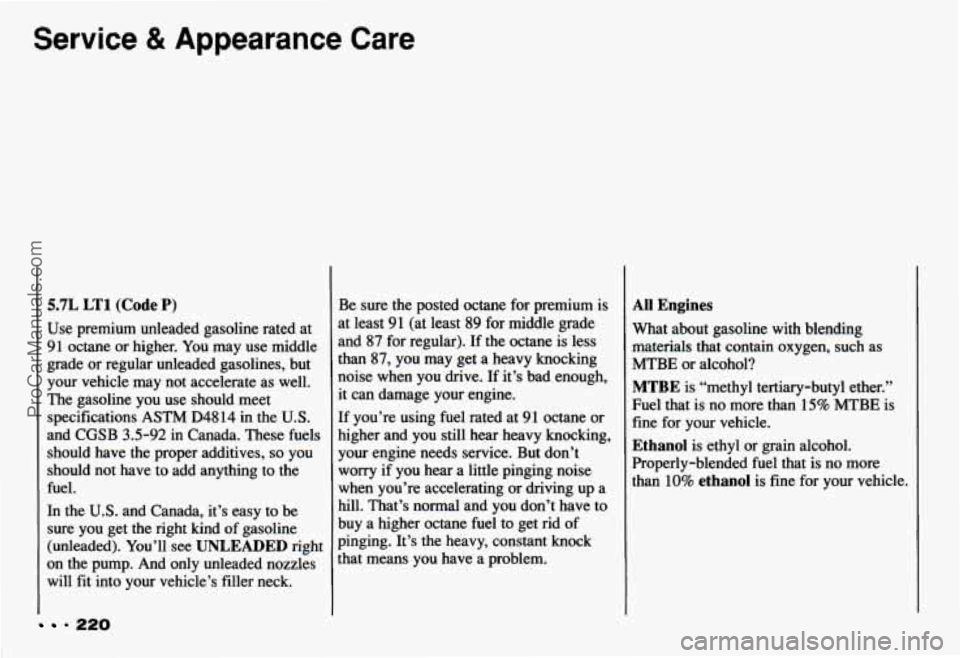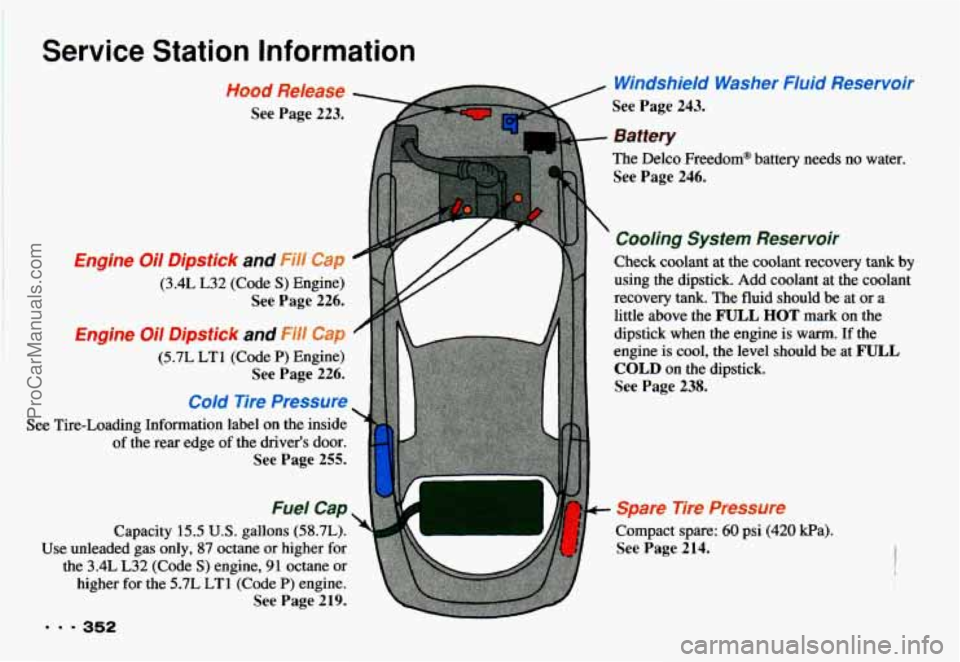Page 223 of 358

NOTICE:
Fuel
The 8th digit of your Vehicle
Identification Number (VIN) shows
the code letter for your engine.
You will
find the VIN at the top left
of your
instrument panel. (See “Vehicle
Identification Number” in the Index.)
3.4L L32 (Code S)
Use regular unleaded gasoline rated at
87 octane or higher. It should meet
specifications ASTM
D4814 in the U.S.
and CGSB 3.5-92 in Canada. These fuels
should have the proper additives,
so you
should not have to add anything to the
fuel.
In the U.S. and Canada, it’s easy to
be
sure you get the right kind of gasoline
(unleaded). You’ll see
UNLEADED right
In the pump. And only unleaded nozzles
will
fit into your vehicle’s filler neck.
Be sure the posted octane is at least 87.
:f the octane is less than 87, you may get
sl heavy knocking noise when you drive.
If it’s bad enough, it can damage your
engine.
If you’re using fuel rated at
87 octane or
higher and you still hear heavy knocking,
your engine needs service. But don’t
worry if you hear a little pinging noise
when you’re accelerating or driving up a
hill. That’s normal, and you don’t have to
buy a higher octane fuel to get rid of
pinging. It’s the heavy, constant knock
that means you have a problem.
ProCarManuals.com
Page 224 of 358

Service & Appearance Care
= 220
5.7L LT1 (Code P)
Use premium unleaded gasoline rated at
91 octane or higher. You may use middle
grade
or regular unleaded gasolines, but
your vehicle may not accelerate as well.
The gasoline you use should meet
specifications ASTM
D48 14 in the U.S.
and CGSB 3.5-92 in Canada. These fuels should have the proper additives,
so you
should not have to add anything to the
fuel.
In the
U.S. and Canada, it’s easy to be
sure you get the right kind of gasoline
(unleaded). You’ll see
UNLEADED right
on the pump. And only unleaded nozzles
will fit into your vehicle’s filler neck. Be
sure
the posted octane for premium is
at least 91 (at least
89 for middle grade
and
87 for regular). If the octane is less
than
87, you may get a heavy knocking
noise when you drive. If it’s bad enough,
it can damage your engine.
If you’re using fuel rated at 91 octane or
higher and you still hear heavy knocking,
your engine needs service. But don’t
worry if you hear a little pinging noise
when you’re accelerating
or driving up a
hill. That’s normal and you don’t have to
buy a higher octane fuel to get rid of
pinging. It’s the heavy, constant knock
that means you have a problem.
All Engines
What about gasoline with blending
materials that contain oxygen, such as
MTBE
or alcohol?
MTBE is “methyl tertiary-butyl ether.”
Fuel that is no more than 15% MTBE is
fine for your vehicle.
Ethanol is ethyl or grain alcohol.
Properly-blended fuel that is no more
than 10%
ethanol is fine for your vehicle.
ProCarManuals.com
Page 356 of 358

Service Station Information
Hood Release
See Page 223.
Engine Oil Dipstick and Fill Cap
(3.4L L32 (Code S) Engine)
See Page 226.
Engine Oil Dipstick and Fill Cap
(5.7L LT1 (Code P) Engine)
See Page 226.
Cold Tire Pressure
See Tire-Loading Information label on the inside
of the
rear edge of the driver's door.
See Page 255.
Fuel Cap
Capacity 15.5.U.S. gallons (58.7L).
Use unleaded gas only, 87 octane
or higher for
the 3.4L
L32 (Code S) engine, 91 octane or
higher
for the 5.7L LT1 (Code P) engine.
See Page 219.
Windshield Washer Fluid Reservorr
See Page 243.
Battery
The Delco Freedom@ battery needs no water.
See Page 246.
Cooling System Reservoir
Check coolant at the coolant recovery tank by
using the dipstick. Add coolant at the coolant
recovery tank. The fluid should be at
or a
little above
the FULL HOT mark on the
dipstick when
the engine is warm. If the
engine is cool, the level should be at
FULL
COLD on the dipstick.
See Page 238.
_?are Tire Pressure
Compact spare: 60 psi (420 kPa).
See Page 214.
ProCarManuals.com